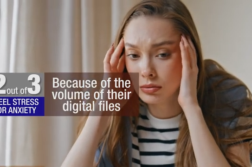HOUSTON, Texas (Ivanhoe Newswire) – Two hundred eighty million people with depression live in a world devoid of color, with little hope of change. Most are prescribed anti-depressants, but what if those don’t work? The gold standard is electroconvulsive therapy, but researchers seeking alternatives just tested IV Ketamine with great results.
Treatment-resistant depression affects 15 percent of Americans.
“What depression has left for them is the feeling of being stuck,” says Vice Chair of Research at Baylor College of Medicine, Sanjay Mathew, MD.
Traditional anti-depressant meds just don’t work, even after several rounds.
Dr. Mathew mentions, “Treatment-resistant depression signifies when a patient has not responded optimally to at least two conventional treatments.”
At that point, patients may undergo electroconvulsive therapy.
“The brain’s seizure and the brain’s response to having that seizure is what is therapeutic. One of the challenges with ECT is, it is often associated with memory loss,” explains Dr. Mathew.
But this study at Baylor College of Medicine tested a viable alternative to ECT – intravenous ketamine, a common anesthetic drug. Some of the 400 participants with major depressive disorder received several infusions over three weeks.
Dr. Mathew further explains, “The overall results suggested ketamine had a slightly elevated rate of response compared to ECT. It means that patients improved in their depression scores of about 50 percent.”
Motivating them to live life again.
“We had one patient who reported that they want to finally sort through their laundry and sort through the mail that had been stacking up in their apartment,” Dr. Mathew expresses.
Dr. Mathew says depression still presents a challenge to physicians because there is not a complete understanding of its full biology. Major depression remains a diagnosis, based on symptoms.
Contributors to this news report include: Donna Parker, Producer; Bruce Maniscalco, Videographer; Roque Correa, Editor.
To receive a free weekly e-mail on medical breakthroughs from Ivanhoe, sign up at: http://www.ivanhoe.com/ftk
MEDICAL BREAKTHROUGHS
RESEARCH SUMMARY
TOPIC: KETAMINE WORKS ON TREATMENT-RESISTANT DEPRESSION
REPORT: MB #5310
BACKGROUND: Ketamine’s effectiveness in combating depression lies in its unique course of action on certain neurotransmitter systems in the brain. Unlike traditional antidepressants that primarily target serotonin or other neurotransmitters, ketamine acts on the glutamate system, specifically by blocking N-methyl-D-aspartate (NMDA) receptors. This leads to increased release of neurotransmitters like glutamate, which then stimulate connections between brain cells. This process, called synaptic plasticity, is believed to play a crucial role in mood regulation and resilience. Additionally, ketamine also interacts with other receptors and pathways, such as the AMPA receptor, to further influence the brain’s neurochemistry. These complex interactions ultimately lead to rapid antidepressant effects, often experienced within hours or days, particularly in individuals with treatment-resistant depression.
(Sources: https://www.nature.com/articles/s41386-023-01629-w
https://www.yalemedicine.org/news/ketamine-depression)
DIAGNOSING: Ketamine is administered in a controlled medical setting, often through intravenous infusion or nasal spray, and is particularly beneficial for individuals struggling with severe or treatment-resistant forms of depression. Its rapid response can provide relief within hours, offering hope to those who haven’t found success with other standard treatments. Ketamine has shown promise in treating a range of depressive illnesses, including major depressive disorder, bipolar depression, and post-traumatic stress disorder (PTSD), making it a promising option for individuals seeking relief from their depressive symptoms. Ketamine is generally considered safe, even for individuals experiencing suicidal thoughts. However, it can lead to side effects such as dissociation, intoxication, sedation, and changes in blood pressure. Other potential effects may include dizziness, headaches, blurred vision, anxiety, as well as nausea and vomiting. It’s important to exercise caution when considering ketamine use, particularly for those with a history of psychosis, schizophrenia, or substance use disorder, as it can potentially amplify these conditions. Additionally, teenagers, pregnant or breastfeeding individuals, and older adults with dementia symptoms should approach ketamine use with extra care due to specific concerns related to their respective health situations.
NEW TECHNOLOGY: The emergence of ketamine as a potential treatment for psychiatric disorders, particularly in cases of treatment-resistant depression, has prompted the U.S. Food and Drug Administration’s (FDA) approval of esketamine, a derivative of ketamine, for such conditions. Unlike traditional antidepressants, esketamine and ketamine can provide rapid relief within hours of administration. However, there has been concern over the lack of extensive research supporting their off-label use. Additionally, the classification of ketamine as a Schedule III controlled substance raises important safety considerations. To ensure safe and effective use, there is a crucial need for increased research and established guidelines for ketamine’s application in various psychiatric conditions.
(Source: https://jaapl.org/content/51/3/320)
FOR MORE INFORMATION ON THIS REPORT, PLEASE CONTACT:
Homa Warren
If this story or any other Ivanhoe story has impacted your life or prompted you or someone you know to seek or change treatments, please let us know by contacting Marjorie Bekaert Thomas at mthomas@ivanhoe.com




